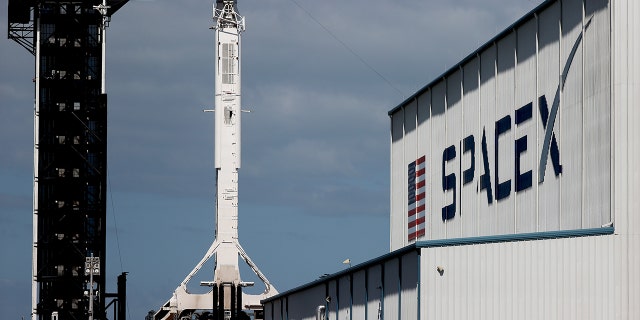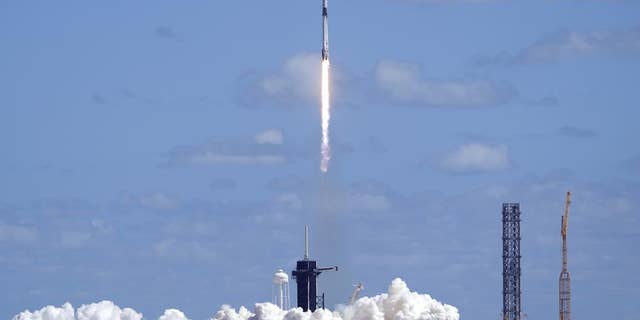NASA was given a “Go” for the launch of a four-man crew to the International Space Station from Cape Canaveral, Florida during the early morning hours on Monday.
In a blog on the space agency’s website, NASA said the Launch Readiness Review for SpaceX Crew-6 was good to go for a liftoff targeted for 1:45 a.m. from Launch Complex 39A at Kennedy Space Center.

The SpaceX Falcon 9 rocket and Crew Dragon capsule on launch Pad 39A at NASA’s Kennedy Space Center on November 09, 2021 in Cape Canaveral, Florida. (Joe Raedle/Getty Images)
The four-man crew, consisting of NASA astronauts Stephen Bowen and Warren “Woody” Hoburg, United Arab Emirates astronaut Sultan Alneyadi and Roscosmos cosmonaut Andrey Fedyaev, will spend nearly 25 hours in the SpaceX Dragon capsule as it catches up to the ISS.
WEBB TELESCOPE DATA HELPS UNCOVER WHAT APPEAR TO BE MASSIVE GALAXIES NEAR COSMIC DAWN
According to NASA, the crew is expected to dock with the space station at 2:38 a.m. on Tuesday.
Once there, all four crew members will remain in the microgravity laboratory for about six months, where they will conduct science experiments and maintenance.

A SpaceX Falcon 9 rocket carrying a Crew Dragon capsule lifts off from Pad 39A at the Kennedy Space Center in Cape Canaveral, Fla., Wednesday, Oct. 5, 2022 for a mission to the International Space Station. (AP Photo/Terry Renna)
Coverage of the launch will begin at 10:15 p.m. on Sunday, which can be found on NASA TV or NASA.gov.
NASA CONFIRMS HALF-TON METEOR CRASHED IN SOUTH TEXAS
Crew-6 is the sixth crew rotation using SpaceX’s human space transportation system, as well as the program’s seventh flight with astronauts.
The crew will board the Dragon Endeavour, which was previously used for Demo-2, Crew-2, and Axiom Mission 1, NASA said on its website.
Once the rocket lifts off, it will reach an orbital velocity of 17,500 mph just before separation of the capsule and booster.
CLICK HERE TO GET THE FOX NEWS APP
The Dragon capsule will start out attached to the Falcon 9 booster, which is fueled with liquid oxygen and rocket grade kerosene, and powered by nine SpaceX Merlin engines.

